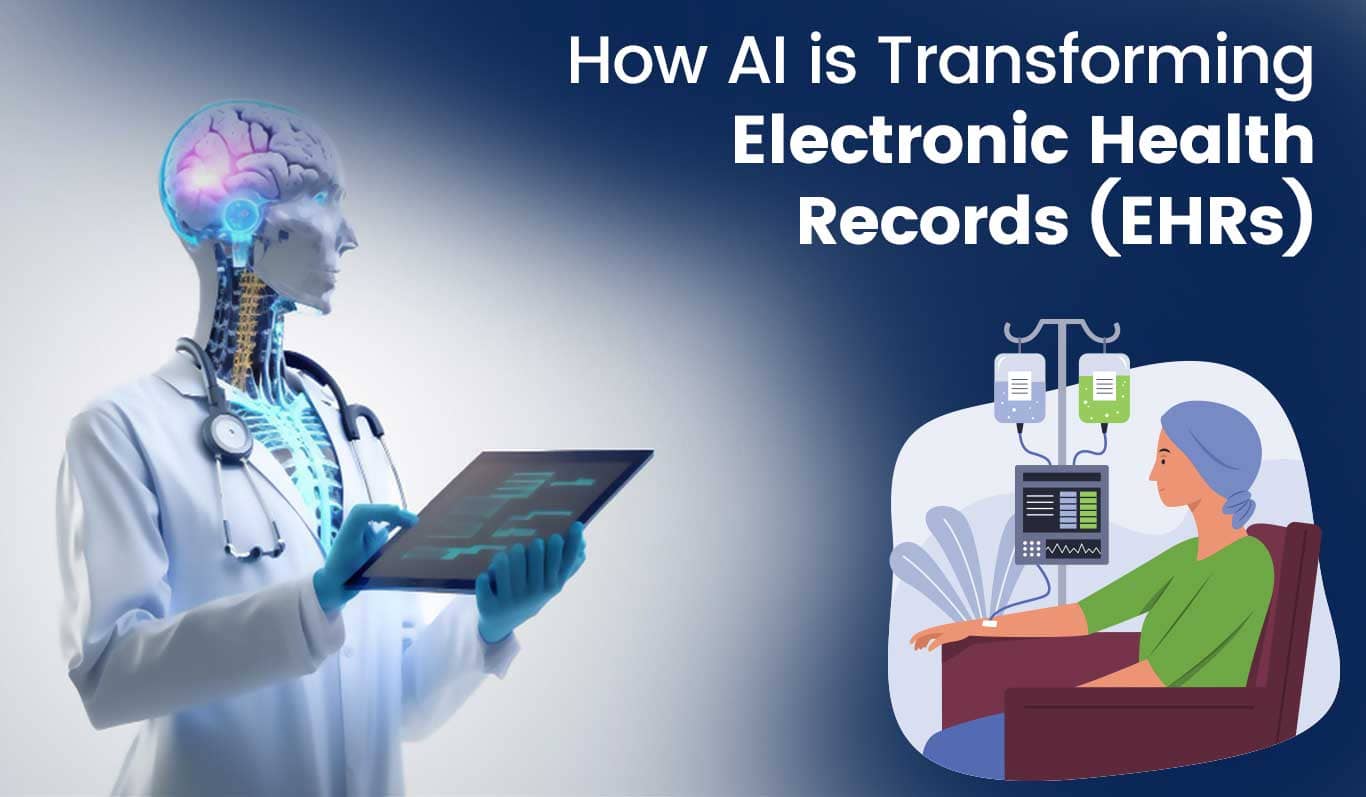How AI is Transforming Electronic Health Records (EHRs)?

Imagine a world where your doctor has instant access to all your health information, can make accurate diagnoses in real-time, and provides personalized care tailored just for you - all thanks to the power of artificial intelligence (AI) in healthcare.
EHRs, or electronic health records, are a crucial aspect of modern medicine. But let's face it, managing all that data can be a real headache. Enter AI in EHRs. By analyzing massive amounts of information, AI is streamlining workflows, providing real-time recommendations, and even predicting potential health risks.
So, whether you're a healthcare professional looking to improve patient outcomes, or a patient who wants the highest possible care, it's time to learn about the incredible impact of artificial intelligence on EHRs. Get ready for a journey through the future of healthcare, where technology and human expertise come together to deliver amazing results.
What are Electronic Health Records (EHRs)?
Electronic health records (EHRs) are like superheroes in the healthcare world! Instead of capes, they wield digital information that saves the day by improving the quality and efficiency of patient care. No more rummaging through stacks of paper to find critical medical information - with EHRs, healthcare providers can access all a patient's health history in one place, including details like demographic data, medical conditions, treatments, medications, laboratory test results, and more.
Think of EHRs as the ultimate wingman for your doctor - they always have your back, and they always know exactly what's going on with your health. By having all your information in one place, EHRs help your doctor make better decisions, faster. And, because EHRs allow real-time data sharing between healthcare providers, you never have to worry about getting stuck in a vicious cycle of duplicate tests, procedures, and treatments.
But the benefits of EHRs don't stop there. They're also critical in the fight against disease and the promotion of public health. By aggregating data from multiple sources, EHRs provide a big-picture view of disease patterns, treatment trends, and population health. And, like true superheroes, they are always working behind the scenes to help public health experts develop effective policies, programs, and interventions.
EHRs are the heroes we need, and the heroes we deserve!
6 Common Challenges in EHR Implementation
Electronic health records (EHRs) may seem like the logical solution to all of healthcare's problems, but they're not immune to a few challenges. It's like kryptonite for their superhero powers.
Let's have a look at some of the common challenges in the implementation of EHR.
Interoperability
Imagine trying to use your phone with a charger that's not compatible. That's what it's like when different EHR systems can't talk to each other. It leads to information being stuck in one place and not being able to be shared, making the whole process less efficient.
User Adoption
EHRs can be like a new gadget that's just too complicated to figure out. Some healthcare providers may struggle with the new technology and find it increases their workload. This can lead to resistance to using it and a lack of buy-in from those who need to use it.
Data Quality
EHRs rely on the accuracy of the information being entered into the system, but what happens when that information is incorrect or missing? This can lead to a lack of trust in the information stored in the EHR.
Data Security
EHRs hold sensitive patient information that needs to be protected from prying eyes, but ensuring that security can be a challenge. One data breach can result in significant harm to patients and a loss of trust in the EHR system.
Implementation Costs
Implementing an EHR system can be expensive and requires significant investments in technology, infrastructure, and training, making it difficult for smaller healthcare organizations to adopt.
Workflow Disruptions
EHRs can be like a wrecking ball, destroying established workflows and processes. Healthcare providers who are used to doing things a certain way may struggle to adapt.

AI in EHR: The Way in Which it's Revolutionizing the System
Data Management: With AI, we have the ability to process and analyze vast amounts of data stored in EHRs, uncovering patterns and insights that might have gone unnoticed. This can lead to more effective treatment plans, tailored specifically to each patient's unique needs.
Clinical Decision Making: AI can assist healthcare providers in making more informed decisions by offering recommendations based on the analysis of data and best practices in medicine. This results in improved patient outcomes and a more efficient healthcare system.
Streamlined Workflows: AI can automate routine tasks within EHRs, freeing up valuable time for healthcare providers to focus on providing patient care. This can result in increased productivity and reduced burnout for providers.
Interoperability: By leveraging AI, different EHR systems can communicate and share information with each other more effectively. This leads to improved collaboration between healthcare providers and better coordination of care for patients.
Data Accuracy: AI can assist in verifying the accuracy and completeness of information stored in EHRs, leading to a more reliable and trustworthy system. This is crucial in ensuring that healthcare providers have the right information to make informed decisions.
Patient Engagement: AI can provide patients with personalized health information and recommendations, empowering them to take an active role in their own care. This can result in better patient outcomes and increased satisfaction with the healthcare experience.
Conclusion
The future of AI in EHR is incredibly exciting, with endless possibilities for innovation and growth. From improving clinical decision support, to transforming population health management, delivering telemedicine and enhancing the overall efficiency of EHR systems, AI has the power to change the face of healthcare as we know it. So hold on tight, as we journey towards a future where technology and medicine come together to create a healthier, happier world!!!
Request a Quote
Categories
Popular posts
Best Practices for Software Product Engineering Every CTO Should Implement
2023-14-18How to Build Your Own On-Demand Carpooling App Services?
2023-08-25How to Start an On-Demand Fuel Delivery Business: A Comprehensive Guide
2023-07-28Empowering Miners: How Fleet Management Apps are Transforming the Mining Industry?
2023-07-21A Complete Guide to Develop a Food Delivery App for Restaurants in 2023
2023-07-08Mobile Apps Transforming the Travel Industry: A Game-Changer in Travel Planning and Experience
2023-07-07
